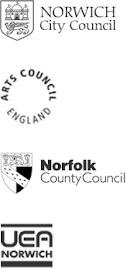Wednesday Morning
The second salon session's title "Nature and Panic" was a sombre title. In the idyllic surroundings of the UEA campus, where the only possible threat is the physical size of the numerous rabbits (clearly being fed on student ready meals), the ominous world can seem along way from us. Adam Thorpe gave the first presentation, and followed on from some observations he'd made yesterday about having a particular view of time. On an archeological dig a few years ago, he'd been amazed by how an ancient site had brought up evidence of a hearth that had been used for hundreds of years. Our ancestors it seems believed in the eternal - without a written history, and with peoples spread out across the land, a sense of permanence, if not of life, certainly of existence was commonplace. If the history of this planet was revisited as the journey from London to Norwich as had been posited during Monday night's lecture, we are apparently just coming into Norwich station - but Thorpe baulked at this: for what comes after? This, he insisted, was not scepticism about the science, but about the almost theological tenets of the climate change debate, with scientists as priests. Surely, science was equally to blame in getting us into this mess? Thorpe's often written about history, but with a contemporary sensibility - and made the link, between medieval indulgences, available to the rich to forgive their sins, with modern ideas of carbon offsets to forgive our "carbon sins. Our panic is both a media one, and a Western one - as other contributors to the debate pointed out. For those in Britain and America, our fears and perils are different than those in, say, Eastern Europe, where freedom, and the loss thereof, remains a living memory. Whilst in India, just beginning to gain some of the benefits of a growing economy, the idea of climate change as the key issue of the day, or a reason to "panic" would seem absurd...a marginal and marginalised affair. It was pointed out that though on the one hand there seemed to be a need for some trans-national movement for ecological change, the risks of ecological Robert Mugabe were real.
If our sense of panic is so embedded now in the Western psyche - then how writers deal with this was a more difficult issue. We'd moved on, it seemed from yesterday's thoughts around being true about nature, to something more difficult to articulate. Yet, at the same time climate change, like 9/11, was in danger of becoming a media event, with the artistic imperative forced upon us for that reason. Should we, the writers in the room, be making some kind of statement, lying as if dead on the rabbit-plagued lawns of UEA?
C.K. Williams, in the second part of the day, talked about his own writing, and how increasingly climate change had become his subject, finding its way into many of his poems. He talked about early man, the Paleolithic cave painting from 30,000 years ago, where, it appeared, an aesthetic was already in place. Our response to nature could, even that far back, already encompass humour, aestheticism, even love for our landscape. Man has already suffered climate change, or a changing climate, with the virtual wiping out of the reindeer in an earlier age, causing unknown catastrophes from which we only somehow survived. He spoke about how the sense of dread that you get from knowing more about climate change can certainly affect a writer who has takes a depressive view on things; but also, that as a writer - the task is always to look for beauty. He spoke about the lack of hope in a novel like Cormac McCarthy's "The Road" - a book I'd packed in my bag on the way down to Norwich, but had left for another time - with its incredibly sadistic, dystopian view of the future: our darkest fate if you like. I probably wasn't the only person in the room wanting a little light at this point, enter stage left Beckett, who, always seems to turn up in conversation when there's some brooding to be done. A need for a kind of optimism, even if it's only humour, or perhaps humanity, becomes a necessity. There's always the search for beauty even if its a broken world. I don't know if we all agreed with the dark pessimism that was sketched out here: after all, even in the worst of times, art - and great art can flourish. Though, its perhaps not the very worst of times; compare the flowerings of Weimar Germany to what happened afterwards, or the virtual extinction of music in post-revolutionary Ethiopia. Was there a certain pathology in extreme situations that led the writer into a dark place? If so, what was the way out? It was a rather nervous laugh we gave when Gwyneth Lewis pointed out the mordant truth, that people often got to beauty spots to kill themselves.
A panic hadn't really gripped hold of the group - but a sense that we still needed to tease out the mysteries of how to deal with a sense of "dread" - perhaps the west has had it since the 2nd World War - potential nuclear holocaust first, global warming second. Yet, may that be a better state than walking blindly into battle, because God and your country needs you? Like yesterday, both speakers gave detailed and learned "think pieces", adding history and philosophy to yesterday's ecological expertise, and demand reviewing, revisiting, when they're put up on the web, following the event.


1 comment:
Two words: polar cities. google the term
also now dubbed Lovelock Cities
google that term too
danny
Post a Comment